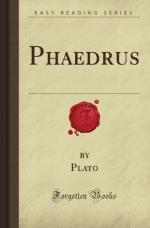
|
| Name: _________________________ | Period: ___________________ |
This test consists of 5 multiple choice questions, 5 short answer questions, and 10 short essay questions.
Multiple Choice Questions
1. What do rhetoricians use to change the appearance of matters?
(a) Truth.
(b) Manipulation.
(c) Tradition.
(d) Logic.
2. What does Socrates say men usually engage in?
(a) Nutritional activities.
(b) Dangerous activities.
(c) Educational activites.
(d) Sensual activites.
3. What kind of function does Socrates consider the analytical methods to have?
(a) Artistic.
(b) Heroic.
(c) Catalystic.
(d) Educational.
4. What does Socrates say happens to lovers who restrain desire?
(a) They end the passion.
(b) They become enslaved.
(c) None of these.
(d) They seek friendship.
5. What do the Muses use to inspire humans?
(a) Poetry.
(b) Madness.
(c) All of these.
(d) Music.
Short Answer Questions
1. What does Socrates say souls will retain in different lives?
2. Which god gets violent when in love?
3. What does Phaedras say makes something debatable?
4. What does Socrates say the image of eternal beauty does to the black horse?
5. What does Socrates say is a common attribute among slaves?
Short Essay Questions
1. What does Phaedras say must happen in order for an opinion to be formed?
2. What is the only thing that can ease the pain of a soul overcome by desire, according to Socrates?
3. What does Socrates say happens when lovers restrain their desires?
4. What does Socrates say about the white chariot horse in his love analogy?
5. What does Socrates say will happen when giving a speech if a speaker does not know all the skills needed?
6. What does true beauty do to a man according to Socrates?
7. What does Socrates say a man must know in order to deceive others?
8. What does Phaedras say a man must do if he wants to make something appear differently?
9. Why does Socrates say a speech giver should know about his audience?
10. How does Socrates say the chariot master must treat the black horse?
|
This section contains 650 words (approx. 3 pages at 300 words per page) |

|




